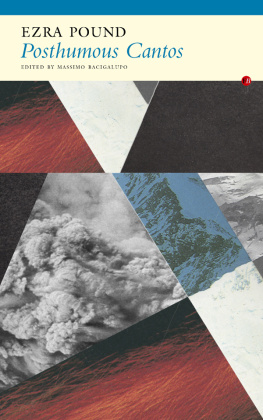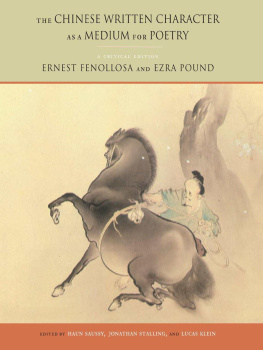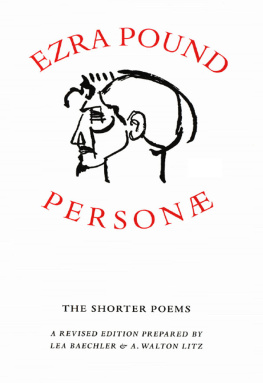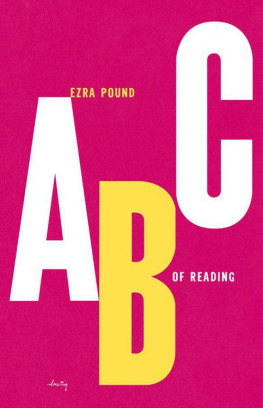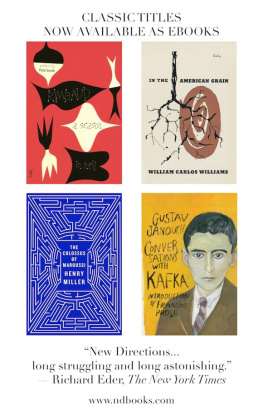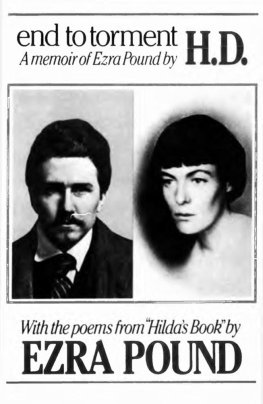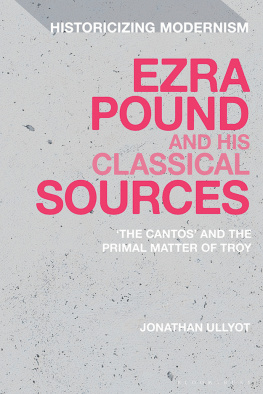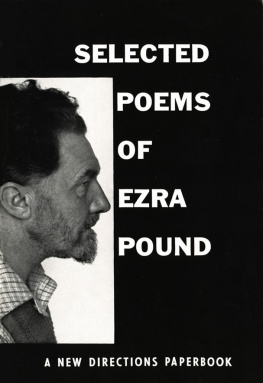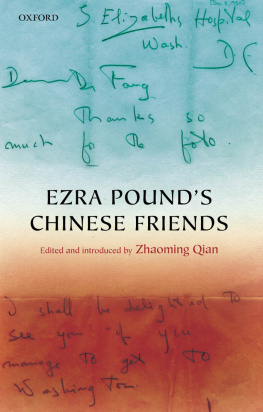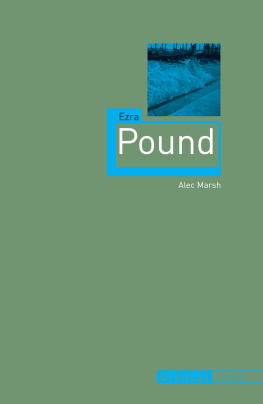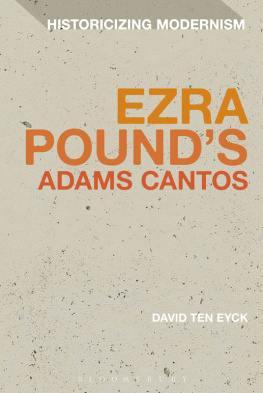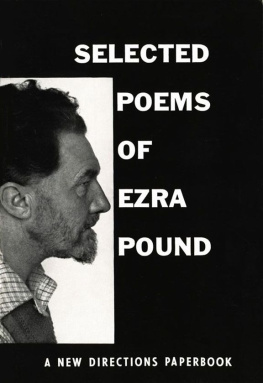Ezra Pound - Posthumous Cantos
Here you can read online Ezra Pound - Posthumous Cantos full text of the book (entire story) in english for free. Download pdf and epub, get meaning, cover and reviews about this ebook. publisher: Carcanet Press, genre: Non-fiction. Description of the work, (preface) as well as reviews are available. Best literature library LitArk.com created for fans of good reading and offers a wide selection of genres:
Romance novel
Science fiction
Adventure
Detective
Science
History
Home and family
Prose
Art
Politics
Computer
Non-fiction
Religion
Business
Children
Humor
Choose a favorite category and find really read worthwhile books. Enjoy immersion in the world of imagination, feel the emotions of the characters or learn something new for yourself, make an fascinating discovery.
- Book:Posthumous Cantos
- Author:
- Publisher:Carcanet Press
- Genre:
- Rating:4 / 5
- Favourites:Add to favourites
- Your mark:
- 80
- 1
- 2
- 3
- 4
- 5
Posthumous Cantos: summary, description and annotation
We offer to read an annotation, description, summary or preface (depends on what the author of the book "Posthumous Cantos" wrote himself). If you haven't found the necessary information about the book — write in the comments, we will try to find it.
Posthumous Cantos — read online for free the complete book (whole text) full work
Below is the text of the book, divided by pages. System saving the place of the last page read, allows you to conveniently read the book "Posthumous Cantos" online for free, without having to search again every time where you left off. Put a bookmark, and you can go to the page where you finished reading at any time.
Font size:
Interval:
Bookmark:
Posthumous Cantos Ezra Pound (18851972) is one of the most influential, and controversial, poets of the twentieth century. His poetry remains vital, challenging, contentious, unassimilable. Massimo Bacigalupo is an experimental filmmaker, scholar, translator and literary critic. Since 1990 he has been Professor of American Literature at the University of Genoa. Ezra Pound
 Every effort has been made by the publisher to reproduce the formatting of the original print edition in electronic format. However, poem formatting may change according to reading device and font size.
Every effort has been made by the publisher to reproduce the formatting of the original print edition in electronic format. However, poem formatting may change according to reading device and font size. First published in Great Britain in 2015 by Carcanet Press Ltd, Alliance House, 30 Cross Street, Manchester M2 7AQ. This eBook edition first published in 2015.
Poems Omar Pound and Mary de Rachewiltz, 2002
Editorial matter Massimo Bacigalupo, 2015
The paperback format of this book was first published in a binlingual edition in 2002 by Arnoldo Mondadori Editore S.p.A., Milan The right of Massimo Bacigalupo to be identified as the editor of this edition has been asserted by him in accordance with the Copyright, Designs and Patents Act of 1988
All rights reserved This eBook is copyright material and must not be copied, reproduced, transferred, distributed, leased, licensed or publicly performed or used in any way except as specifically permitted in writing by the publishers, as allowed under the terms and conditions under which it was purchased or as strictly permitted by applicable copyright law. Any unauthorised distribution or use of this text may be a direct infringement of the author's and publisher's rights, and those responsible may be liable in law accordingly. Epub ISBN 978 1 78410 121 3
Mobi ISBN 978 1 78410 122 0
Pdf ISBN 978 1 78410 123 7 The publisher acknowledges financial assistance from Arts Council England. 
The part contains the whole, and canto 1 already offers a blueprint for the entire poem, going from Odysseuss descent to Hades to a vision of Venus, she of dark eyelids, as well as mirthful. She is Baudelaires beautiful temptress, revisited by an American poet who arrived in Europe with an insatiable desire for knowledge and self-affirmation. Consequently, over the fifty-year course of Pounds poem, states of mind alternate, and the only continuous and irreversible story that we can make out in its turbulent pages is the poets own life, his travels and sudden departures, his pitfalls and misadventures, his aesthetic youth, his maturity increasingly occupied by economic projects, the day of reckoning of his incarceration, the relatively serene twilight of his final years. Pound always wrote with incisiveness and passion, and the best parts of The Cantos are an eccentric but powerful chronicle of his times and of some of their most representative figures. The troubadour and friend of Yeats of the London salons; the Renaissance scholiast and guru of Shakespeare and Company, the Paris bookshop patronized by Joyce and Hemingway; the passionate tennis player and compiler of ABCs (How to Read, Guide to Kulchur, ABC of Economics), perfectly naturalized in Rapallo during the two decades of Fascism; the desperate and unregenerate prophet of the Pisan cage; and finally that painful persona the poet in the insane asylum of Washington, DC, not far from the White House and its tenant, to whom he believed he had much to impart. The Cantos began among false starts and revisions between 1915 and 1925, when they first appeared in a book-length sequence, A Draft of XVI Cantos a title still suggesting tentativeness, though cantos 116 were to remain substantially unchanged in later editions. The Cantos began among false starts and revisions between 1915 and 1925, when they first appeared in a book-length sequence, A Draft of XVI Cantos a title still suggesting tentativeness, though cantos 116 were to remain substantially unchanged in later editions.
In 1917 Pound published in Poetry, the groundbreaking Chicago monthly of which he was European correspondent, Three Cantos, a rich and brilliant overture to his long poem, devoted in part to a debate with himself on whats left for me to do, in part to descriptions of cherished landscapes (chiefly Sirmione on Lake Garda) and to extracts from, and comments on, his omnivorous reading (Lorenzo Valla; Catullus; the Chinese poets, who were a recent enthusiasm). The last of Three Cantos was for the greater part a version of Book XI of the Odyssey, the descent to Hades of Ulysses to consult Tiresias a version, as the poet-scholar notes, based not on Homers original but on a Latin crib published in 1538. Why so? Essentially because Pound always uses the material at hand, and perhaps Latin was easier for him to read and misread than Greek. Through the travesty of a double translation it might be possible to recover the foreignness and potency of the original. Yet Pounds main conceit here was the use in his version of the rhythms and alliterations of the Old English Seafarer and Wanderer, which he had admired at college. The result is a music touched by archaism, a neo-medievalism that blends with classicism and modernism in a characteristic Poundian pastiche: history is present in the layers of the text.
As for subject-matter, Odysseuss encounter with the dead is a metaphor of Pounds own confrontation with friends lost in the First World War, which he experienced as a non-combatant in London, in a period of intense productivity, possibly enhanced by that great European tragedy. It also alludes to Dantes otherworldly travels and encounters, and suggests that The Cantos will be a summoning of ghosts, from whom much will be learned about our present and future. Between 1917 and 1922, the Three Cantos of 1917 were followed by nine further cantos, numbered progressively, but when in 1923 Pound gave quasi-final form to cantos 116 for book publication, he radically revised the overture, with the same decisiveness he had brought one year before to the manuscript of T. S. Eliots The Waste Land. The descent to Hades of the third canto became, with appropriate cuts, canto 1, thus providing a grandiose though precarious introduction to all that follows.
Canto I and Canto II of 1917 were also broken up, rearranged and augmented. The poem resulting from these radical changes was more experimental. Pound no longer detained his readers with doubts and perplexities about his intentions: he said what he had to say, and stopped. In this way, despite some uncertainties, the ship of The Cantos was launched, not to be overshadowed for esotericism and experimentalism by those two coeval cruisers Ulysses and The Waste Land. However, not all was gain in the transition from Three Cantos to XVI Cantos. Pound was more confidential and sympathetic in the early version, with his students literary passions, his portrait of the not very young artist (he was over thirty), his not invariably persuasive anecdotes (this was not to change in the final version), and his infectious lyric breakthroughs.
Next pageFont size:
Interval:
Bookmark:
Similar books «Posthumous Cantos»
Look at similar books to Posthumous Cantos. We have selected literature similar in name and meaning in the hope of providing readers with more options to find new, interesting, not yet read works.
Discussion, reviews of the book Posthumous Cantos and just readers' own opinions. Leave your comments, write what you think about the work, its meaning or the main characters. Specify what exactly you liked and what you didn't like, and why you think so.

